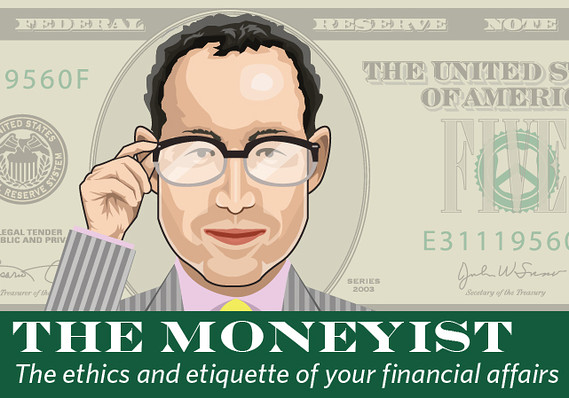
Dear Moneyist,
My husband and I grew up dirt poor — I mean he literally had holes in the floor where you could see the dirt. I was fairly better off, my single mother had been expected to marry and have no need for understanding how things like credit worked (her father was a loan officer; it was a different time). At times, we had a little money and, at other times, we ate at the local churches.
‘Our only assets are in a sock drawer.’
As a result, my husband and I suffer the same affliction. We were given occasionally some pocket change to buy treats, candy, chips, sodas, etc. This is the only time money would cross our fingertips, and it would be gone within minutes to an hour. Bottom line — we only know how to spend and not how to save. We only “live for the moment” when it comes to finances.
‘This has become a serious problem.’
• We are coming up on our 10th wedding anniversary.
• We have an 11-year-old son.
• Between us we have 3 teenage children from previous relationships that do not live with us.
• We live in Texas.
• We have no life insurance or “savings,” and we rent the condo we live in.
• Our only assets are in a sock drawer.
Also see: My husband is unemployed — we are shamefaced tipping our doormen a pittance
My husband doesn’t believe in “credit” (”it’s all made up numbers”). He also doesn’t believe that we can afford life insurance — even though we dine out several times a week. My husband doesn’t have a bank account and the man owns a sub-contracting company. (Literally, he cashes checks in a strip mall for outrageous fees, and who knows where that money goes.)
‘We apparently don’t believe in health insurance either.’
About 2.5 years ago we bought a property in the woods near a lake, set a small cabin on it, and this is where my husband wishes to retire. It’s valued at $38,000, we owe $29,000. We live in a vacation destination city and in 5 or 10 years, we won’t be able to afford to any more. We have racked up $10,000 in credit-card debt after my husband suffered a fall and broken bones last year.
Don’t miss: I earn $15 an hour and will inherit $150,000 — how do I secure my future?
We apparently don’t believe in health insurance either. We are both in poor health, we pay cash for our son’s dental and doctor visits, and because I’m a satisfactory degree of Native American descent, my son and I can run up to Oklahoma for major health needs for free if needs be. I did have to go to the ER last year. I pay $30 per month toward that bill, there’s no interest on the account so I can take my time paying it off. My husband does not pay his medical debt.
‘My situation is a little different’
I was pre-law in college. I’ve always believed in educating oneself to the fullest extent possible no matter your life’s situation — and so I’ve been reading your letters for years and researching ways to improve my situation for months.
• I do believe in saving a little money even if you don’t make very much. (And I have about $400 saved in a money-market account I opened 2 months ago. Believe me, this is a big deal.)
• I do believe that the poorest people need life insurance the most. (Ever watch “A Tree Grows in Brooklyn”? That mother paid the life insurance man before she put food on the table!)
• I also believe in investing what little you have, even if it’s a small amount of money you were going to spend at the Chili’s Restaurant. I have a Betterment account being used as an additional savings vehicle because over the course of many years, certain bonds and funds tend to be a safe place to keep money, and occasionally grow it by a couple of percent, which is a little better than the money market account.
See: I received $500 from an insurer for damage to my car — can I spend it on me?
I also have a Robinhood account where I have deposited a minuscule amount of money for investment testing, which I will only be doing after massive amounts of research on the TD Ameritrade platforms on the account. I’m not going for day trading or swing trading, just looking for possible safe-ish opportunities with minimal risk patterns and possible small growth.
‘Here is how I approach our finances’
• I don’t believe in giving children money to buy themselves something you would buy them. (If I want my son to have an ice cream I buy him one. If I hand him dollars they go in the “bank” I’ve set up for him at home complete with a check register. We’ve been doing this for 4 years. Occasionally, he will spend money on a big ticket item. Recently, he bought a $30 book.) I don’t believe in ’disposable income.”
• My company is starting a 401(k) program with Mass Mutual with a 25% match. (It’s not a lot, but free money is free money. Sadly, as the beneficiary I think my husband would have to sign for it.)
• $7,000 of that credit-card debt we racked up is on my credit cards — and I only make $12 per hour.
• My husband always said no to savings and investment — so he is unaware of any accounts mentioned.
• Like I said, we are in poor health and need life insurance if anything, but that’s not something I can get for him on my own. Our youngest child is only 11.
‘My husband always said no to savings and investment.’
Do I enroll in the 401(k) or do I wait until I get the credit-card debt paid down? Can I get a life insurance policy on my husband without his permission? Even maybe final expense? (Oh, I have an AD&D policy for $50,000 for me and $25,000 for my spouse or child, with my sister as the beneficiary. It costs me $10 per month.
You see what I mean about affordability? She is also the trusted contact for every other account, because she understands I’m trying to protect just a little of our money from the wasted dollars we spend every month. )
I know any earnings I could see on investment is nothing compared to credit-card interest, which I have been charged with paying off all by myself.
Basically, I don’t have a plan. And I need one. Help. Thank you.
Secret Saver
Dear Saver,
Your case is a classic, the classic, example of why you should discuss your approach to finances before you get married. It doesn’t just impact your happiness, it has multiple effects on your peace of mind, your children’s future, their education, your ability to retire early or at all, insurance against the kind of health emergency that can bankrupt families and cost them their home.
Recommended: Should I spend my daughter’s $100,000 trust fund on private schools and ballet classes?
Out-of-pocket health costs for elderly Americans aged 65 and over who use Medicare ate up approximately 41% of the average Social Security income in 2013, according to nonprofit organization Kaiser Family Foundation. It expects such costs will soar to 50% of the average social security income by 2030. We are all temporarily abled. As we age, that changes. You need a plan.
‘Making minimum payments on your credit card is a long road to nowhere.’
Keep contributing to your 401(k) plan. Your husband does not have to sign as a beneficiary. You don’t even have to name your husband as a beneficiary. You husband may be beyond hope, but explain to him that for someone who doesn’t believe in debt, he shouldn’t have racked up $7,000 on your credit card. This should be your No. 1 priority. The interest will continue to pile up.
Allow me to put your credit-card debt into perspective. A $7,000 credit balance with an 18% annual rate, with a minimum payment of 2% of the balance, or $10, whichever is greater, would take 188 months or just nearly 16 years to pay off. Making minimum payments on your credit card is a long road to nowhere, and making no payments will lead to debt collectors and more stress.
You could sit down with your husband to explain how you would like to plan for the future. I don’t know what kind of childhood or upbringing he had that has made him so distrustful of institutions, but he needs to see the consequences of his actions in black and white. If that fails, go ahead and keep making your own plans and never allow him to make purchases on your credit card again.
‘Keep instilling your financial values in your children.’
Another tip from a financial adviser. Tristan Harding, director of insurance at PNC Wealth Management, asks you to discuss your health issues with a trusted professional and consider life insurance. “The life insurance benefit would be able to pay off your credit-card debt and be used as income replacement for your husband’s income at least until your son is no longer a dependent.”
Keep instilling your financial values in your children. More than one-fifth of American teens lack basic financial literacy skills. China had the most financially literate teens in the world, when evaluating 15-year-old students’ knowledge in science, reading and mathematics across 15 countries. The U.S. ranked No. 7. Teaching your children to work for what they have is invaluable.
The current administration is rolling back Obamacare or the Affordable Care Act that would help people with low incomes and pre-existing health conditions. If you don’t have health insurance through your job, you can read more here about the benefits in Texas and here for cheaper options and Medicaid. There is a legislative effort in Texas to kill the Affordable Care Act.
“Living paycheck-to-paycheck is not the answer.’
There was a heated and robust discussion of your question on the Moneyist Facebook Page. One member described your husband as an “off the grid” guy. He has genuine fears about institutions and bank accounts. Given the number of data breaches, who could blame him. But living paycheck-to-paycheck is not the answer. Somehow, with the help of family, you have to help him see that.
The difficult news: There may come a point where your love for your husband and your need to secure your future become mutually exclusive choices. I believe you have the willingness and obviously the intelligence to build a financial future for you and your children. When you have done everything that you believe can be done, that is a decision you may have to make.
Two more things: Good luck. Stay in touch.
Do you have questions about inheritance, tipping, weddings, family feuds, friends or any tricky issues relating to manners and money? Send them to MarketWatch’s Moneyist and please include the state where you live (no full names will be used).
Would you like to sign up to an email alert when a new Moneyist column has been published? If so, click on this link.
Hello there, MarketWatchers. Check out the Moneyist private Facebook group, where we look for answers to life’s thorniest money issues. Readers write in to me with all sorts of dilemmas: inheritance, wills, divorce, tipping, gifting. I often talk to lawyers, accountants, financial advisers and other experts, in addition to offering my own thoughts. I receive more letters than I could ever answer, so I’ll be bringing all of that guidance — including some you might not see in these columns — to this group. Post your questions, tell me what you want to know more about, or weigh in on the latest Moneyist columns.
Get a daily roundup of the top reads in personal finance delivered to your inbox. Subscribe to MarketWatch’s free Personal Finance Daily newsletter. Sign up here.









